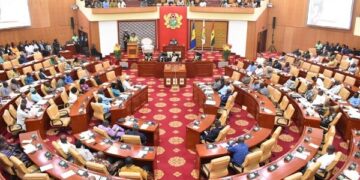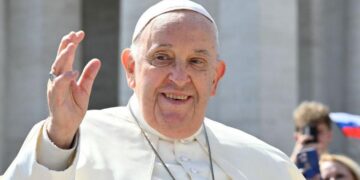The Public Financial Management Act (2016) requires every finance minister to present a fiscal review (of the budget and the economy) to Parliament every July.
The current finance minister, however, has steadily degraded the exercise into a comical display of incoherent biblical quotations, completely disregarding the koko and koosey issues that matter most to Ghanaians. He was at it again on 31st July 2023 when he appeared in the People’s House.
He began in the 6th paragraph after the usual parliamentary niceties by hailing “the Psalmist” (Psalm 118:23) for saving Ghana from “empty shop shelves” and other calamities after Covid. He then went secular (and circular) and somehow attributed the Psalmist’s heavenly work to “investments we have collectively made during this difficult period since March 2020.” He soon reverted to the spiritual and reminded us that “This can only be the doing of the Lord and it’s marvellous in our sight”.
By the 10th paragraph, he was waffling again, suggesting that, despite all the great works of the Psalmist and the Lord, by July 2022 Ghanaians had become “despondent and the future was uncertain”. The government thus begged the International Monetary Fund (IMF) for our 17th bailout in 56 years. And then he said, with a straight face, that thanks to the IMF (not the Psalmist or the Lord), “our steps are more grounded, the vision is clearer, we are confident about the future, and we can all sense the recovery.”
He seemed oblivious of the warning in Exodus 20:7 that “Thou shall not take the name of thy God in vain, for the Lord will not hold him guiltless that taketh his name in vain.”
After more double-talk and dubious analyses, he ended his fiscal sermon with a doomsday prophecy of GDP growth of only 1.5% in 2023, down from the 2.8% he had prophesised earlier in the year, and about half the 3.1% recorded in 2022. In effect, Ghanaians will be moving forward in reverse in 2023. He’s playing chaskele with our lives.
To recover from this childish and confusing sermon, I turned to a favourite reggae song, “The Shepherd,” by Culture, in which they quote Jeremiah 23 and warn ominously: “Woe to the careless shepherd that lead Jah righteous sheep astray.” God doesn’t like being mocked, especially by people who talk from both corners of their mouths (Galatians 6:7).
But we still must ask how 33 million Ghanaians could allow themselves to be held hostage by one hopelessly incompetent man, a fake preacher whose mismanagement has wrecked the economy and led Jah’s righteous children astray. (There are now Ghanaians on the Mexico-US border seeking asylum in the USA).
He’s the very embodiment of not just incompetence but also rank hypocrisy.
In 2019, he lambasted his predecessors for going on a “borrowing spree” after the economy was re-calculated (rebased) in 2010 and found to be bigger than previously thought. But he did even worse following the 2018 rebasing under his watch. He borrowed $2 billion in Eurobonds in 2018 alone, and by 2021 he had racked up $11 billion in Eurobonds over a four-year period, compared to the $4.5 billion issued by his predecessor in five years. He accounts for over 74% of all Eurobonds since the first issue in 2007.
There is more: billions of dollars and cedis in other debts in his name, despite the steep growth in oil revenue since he took office in 2017. Oil revenue has shot up from GH¢218 million in 2016 to over GH¢6.4 billion in 2022, having fallen from GH¢2.2 billion in 2019 to GH¢1.9 billion in 2020 before making a rapid recovery in 2021.
He blames Covid and the Ukraine war for his mess, but the facts say otherwise. Long before Covid, in November 2019, when he presented the 2020 budget to Parliament, he prophesised a steady decline in GDP growth from 7.0% in 2019 to as low as 4.6% in 2022, followed by a weak recovery to 6.5% in 2023.
This grim outlook reflected the consequences of his vindictive and ruinous policies since 2017, including the wanton destruction of the financial sector – the source of oxygen for any economy – which shrank by an average of nearly 12% per year, and the very dynamic construction sector, which declined by 6.5% by the end of 2019, fuelling unemployment. Growth in other sectors either slowed or also declined. The economy was heading for the doghouse long before the world heard of Covid.
And whilst Covid did stagger the economy and put a strain on government finances for most of 2020, it also became a financial bonanza for the government, which raised nearly GH¢28 billion (not the GH¢21.8 billion in the Auditor-General’s report) to fight the pandemic. (The report omitted the GH¢5.8 billion, or US$1 billion, that the IMF gave the government in 2021, in addition to the US$1 billion (GH¢5.6 billion) given in 2020). (Combined tax revenue shortfall in 2020 and 2021 was GH¢5 billion).
Of the GH¢28 billion, nearly GH¢12 billion (about 43%) “was spent on Covid-related activities”, according to the report, with the remainder going to the nebulously named “budget support,” which could mean anything.
The positive impact on the economy – and the budget – of all that money is yet to be felt. Rather, the government has followed the IMF’s crazy advice and imposed more taxes and raised the rates for others, ostensibly to “revitalise” the economy and “mobilise revenue”. The woman roasting plantain by the roadside would tell you this is madness, and it is, as reflected in the minister’s gloomy economic prophecy for 2023.
What now?
Perhaps the minister and his cousin the president, who has taken nepotism to new heights and given the minister his unconditional support to ruin the economy and our lives (whilst building a cathedral to God with stolen public funds) need to be reminded of God’s wrath towards wicked leaders and false prophets:
Proverbs 29:2
When the righteous increase, the people rejoice. But when a wicked man rules, the people mourn.
Jeremiah 23:11-12
Both prophet and priest are godless; even in my temple I find their wickedness,” declares the LORD.
Therefore, their path will become slippery; they will be banished to darkness and there they will fall. I will bring disaster on them in the year they are punished,” declares the LORD.
Kwɛɛ, ‘Prophet’ Ofori-Atta, we too we sabi deh Bible!
Source: Dr. Nii Moi Thompson





















































































